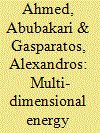| Srl | Item |
| 1 |
ID:
091576


|
|
|
|
|
| Publication |
2009.
|
| Summary/Abstract |
This study investigates the resource consumption of Japanese society since 1979 and its subsequent effects on the economic output of the nation and the environment. In order to quantify resource appropriation and trends in production and consumption, the concept of emergy synthesis is employed. Our results show a significant increase in the total amount of emergy consumed by 66.9% between 1979 and 2003 which comes hand in hand with an increase in the level of environmental stress by 93.7% (quantified as the environmental loading ratio). On the other hand the emergy required to produce 1 USD of economic output has been gradually decreasing which denotes an increase in the efficiency of the conversion of natural capital into economic output. What is most interesting though is the growing dependence of the Japanese economy on imported emergy, increasingly from developing nations, that severely affects the potential for unhindered economic growth. This can prove to be a big barrier that could affect the resource security of the Japanese economy and render it susceptible to risks associated with access to natural resources which in turn can jeopardise its long-term economic sustainability.
|
|
|
|
|
|
|
|
|
|
|
|
|
|
|
|
| 2 |
ID:
171401


|
|
|
|
|
| Summary/Abstract |
Several countries across sub-Saharan Africa have promoted industrial crops to boost rural development, including rural energy poverty alleviation. However, little evidence exists about the intersection of rural development and energy poverty in industrial crop settings. We undertake a household survey to explore multidimensional energy poverty patterns around three operational industrial crop projects in Ghana (oil palm, jatropha, sugarcane). We conduct 850 surveys with households with different involvement in these projects (e.g. plantation workers, smallholders), as well as household not involved (i.e. control groups). Overall, distinct patterns emerge between sites and groups, reflecting the different area, project and household characteristics. Jatropha and oil palm plantation workers register lower energy poverty levels than their respective control groups, while oil palm and sugarcane smallholders register either the same (or higher) energy poverty. This is largely because income from engagement in industrial crop activities can reduce energy poverty for some groups, but only where modern energy options are readily available. In reality, other factors can be equally important, including other livelihood activities (e.g. sugarcane/palm oil processing) and the gender of household head. Such distinct patterns and local dynamics must be understood when aiming to achieve positive energy poverty alleviation outcomes through industrial crop expansion.
|
|
|
|
|
|
|
|
|
|
|
|
|
|
|
|
| 3 |
ID:
103368


|
|
|
|
|
| Publication |
2011.
|
| Summary/Abstract |
Energy security and food security are two key policy objectives of the Japanese government. However, their study and the policies that have targeted them have been disjointed at best. This paper explores the links between these two policy objectives by quantifying the resources used in (a) the agricultural sector as a whole and (b) two very resource intensive sub-sectors, beef and pork production. Emergy synthesis is used as the analytical approach for the period 1975-2005 with the results suggesting that not only is more natural capital currently being used within the agricultural sector but the efficiency of the agricultural production has declined considering the increase in transformity during the same period. What is more important though is that agricultural yield is strongly correlated with resource use (quantified as emergy). This finding suggests that sudden changes in resource supply can affect agricultural production and as an extension national food security. Overall the evidence presented in this paper shows that energy security and food security are indeed interconnected and that integrated policy responses will be required if these issues are to be tackled effectively.
|
|
|
|
|
|
|
|
|
|
|
|
|
|
|
|